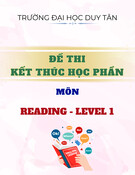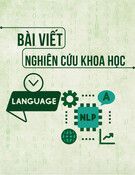
VĂN HÓA https://jst-haui.vn Tạp chí Khoa học và Công nghệ Trường Đại học Công nghiệp Hà Nội Tập 60 - Số 12 (12/2024)
64
NGÔN NG
Ữ
P
-
ISSN 1859
-
3585
E
-
ISSN 2615
-
961
9
MECHANICAL ENGINEERING MAJORED STUDENTS' EVALUATION OF THE EFFECTIVENESS OF EOP WRITING ASSIGNMENTS
ĐÁNH GIÁ CỦA SINH VIÊN CHUYÊN NGÀNH KỸ THUẬT CƠ KHÍ VỀ HIỆU QUẢ CỦA BÀI TẬP VIẾT TIẾNG ANH CHUYÊN NGÀNH TRÊN TRANG HỌC TRỰC TUYẾN EOP Le Thu Huong1,*, Phu Thi Nhung1, Cao Van Anh1, Nguyen Thanh Ha2, Pham Quang Thien3 DOI: http://doi.org/10.57001/huih5804.2024.418 ABSTRACT This study explores students' perceptions of the writing assignments in the English for Occupational
Purposes (EOP) program in general and English for
Mechanical Engineering (EME) in particular. It focuses on their evaluation of the assignments' effectiveness in enhancing wri
ting skills. The research gathers
quantitative data from students enrolled in an
EME course, analyzing their reactions to two major aspects namely the effectiveness of writing exercises completed
at home, and their improvement in writing skills in the long run. Findings suggest that while most students acknowledge the value of writing
assignments in
improving their language proficiency and job-related communication skills, some express concerns about the clarity of instructions, lack of teacher-
student
interactions, and the limited scope of feedback provided. Many students highlight the
practical application of EOP writing tasks, particularly those modeled on
workplace documents like emails, reports, and essays. Overall, the study demonstrates the importance of grading EOP writing a
ssignments to better cater to
students' career aspirations and suggests incorporating more personalized feedback to enhance their learning experience. These insights could help stud
ents
meet the subject’s requirements and support their writing skills. Keywords: writing assignments, EOP program, EME, students' evaluation, teacher's feedback. TÓM TẮT Bài báo này trình bày nghiên cứu quan điểm của sinh viên về việc thực hiện viết bài viết trên trực tuyến trong chương trình Tiếng Anh theo định hướng nghềnghiệp (EOP) nói chung và môn Tiếng Anh Cơ khí (EME) nói riêng. Nghiên cứu tập trung vào việc sinh viên đánh giá hiệu quả của các bài tập viết trong việc cải thiệ
n
kỹ năng viết. Dữ liệu định lượng được thu thập từ sinh viên đang theo học EME, phân tích phản hồi của họ về hai khía cạnh chính bao gồm tính hiệu quả
khi làm bài
viết tại nhà và mức độ cải thiện kỹ năng viết trong dài hạn. Kết quả cho thấy, hầu hết sinh viên công nhận hiệu quả của các bài tập viết đối với việc nâng cao trình độngôn ngữ và kỹ năng giao tiếp phục vụ công việc. Tuy nhiên, một số sinh viên nêu ra một số hạn chế như thiếu sự hướng dẫn chi tiết, thiếu tương tác giữ
a giáo viên
và sinh viên, cũng như phạm vi hạn chế của phản hồi được cung cấp. Nhiều sinh viên nhấn mạnh tính ứng dụng thực tiễn của các bài viết trong EOP, đặc biệ
t là các bài
tập mô phỏng tài liệu công việc như email, báo cáo và bài luận. Tóm lại, nghiên cứu khẳng định tầm quan trọng của việc chấm điểm các bài tập viết trên hệ thố
ng
quản lý học tập EOP để đáp ứng tốt hơn nguyện vọng nghề nghiệp của sinh viên. Bên cạnh đó, nghiên cứu đề xuất tăng cường phản hồi mang tính cá nhân hóa để cả
i
thiện trải nghiệm học tập, giúp sinh viên đáp ứng yêu cầu của môn học và hỗ trợ quá trình phát triển kỹ năng viết của họ. Từ khoá: Bài tập viết, chương trình Tiếng Anh cho mục đích nghề nghiệp, EME, đánh giá của sinh viên, phản hồi từ giáo viên. 1School of Languages and Tourism, Hanoi University of Industry, Vietnam 2Faculty of Foreign Languages, Academy of Policy and Development, Vietnam 3Department of Foreign Languages, Hanoi University of Natural Resources and Environment, Vietnam *Email: huonglt2@haui.edu.vn Received: 05/11/2024 Revised: 15/12/2024 Accepted: 26/12/2024

P-ISSN 1859-3585 E-ISSN 2615-9619 https://jst-haui.vn LANGUAGE - CULTURE Vol. 60 - No. 12 (Dec 2024) HaUI Journal of Science and Technology
65
ABBREVIATIONS EOP: English for Occupational Purposes EME: English for Mechanical Engineering 1. INTRODUCTION It is evident that there is an increasing demand for effective communication in professional contexts, particularly in EOP programs. These programs do not only develop students’ general language proficiency but also equip them with practical writing abilities related to their careers. However, the effectiveness of these assignments largely depends on how well they align with students’ needs and expectations. Even though writing assignments are acknowledged to be important in EOP classes, there is limited research on how students feel about them, specifically in specialized fields like mechanical engineering. Gaining insight from students' perspectives can highlight both the importance of the effectiveness of at-home writing assignments and their long-term development in writing skills. The significance of this study lies in its contribution to the understanding of students' perceptions regarding the effectiveness of writing assignments in English for Occupational Purposes (EOP) programs, specifically in the context of English for Mechanical Engineering (EME). This article provides insights into how successfully writing assignments support students in their learning journey by analyzing the students' perspectives of existing writing practices. It also emphasizes how crucial it is to match writing assignments more closely with industry requirements to guarantee that students gain applicable skills for their future careers. This approach is in line with current research supporting context-driven pedagogy in language instruction [11]. Adding tasks that apply to the job, such as writing emails and reports, makes these projects more meaningful and practical for students, improving their preparation for college and the workforce [4]. In light of this, the study emphasizes how crucial writing assignments are for bridging the knowledge gap between academic programs and industry demands, which helps to improve EOP instruction. The scope of this study is centered on evaluating students' perceptions of writing assignments in the English for Mechanical Engineering (EME) course, which is part of a broader English for Occupational Purposes (EOP) program. Research questions This article focuses on answering the following question: “How effective are writing assignments in Mechanical Engineering English courses in enhancing students' writing productivity and long-term skill development?” 2. LITERATURE REVIEW It is believed that writing skills contribute enormously to the English for Occupational Purposes (EOP) programs specifically in the fields with a technical framework like Mechanical Engineering. In recent years, some inquiries have been made regarding the impact of writing task types on writing productivity and long-term writing development, providing a robust rationale for the exploration of their applicability within the specialized contexts of EOP settings. 2.1. Writing Assignments and Writing Productivity EOP courses enhance the ability to write efficiently clear and coherent texts (writing productivity) As Hyland [11] stresses, assignments for writing that require students to produce particular genres of text, especially those that are based on professional genres such as reports and documents that are usually technical in nature, can stimulate student productivity. Assignments like these develop structured, concise writing, which is crucial to the tasks of Mechanical Engineering. Nonetheless, Chan [8] found that productivity gains are closely based on clear assignment guidelines and assignments that relate to a student’s ultimate professional goals. The current research builds upon those findings, exploring how students felt about at-home writing exercises, as well as discussing their perceived productivity increases. 2.2. Long-Term Skill Development Through Writing Assignments The literature consistently refers to the impact on long-term skills from writing assignments. Hinkel [10] maintains that writing task engagement over time leads to better technical vocabulary, genre and organizational skills. Especially when students are Mechanical Engineering students working in an industry where their communication style must transcend to the industry. Nunan [13] also advocates for iterative assignments with feedback loops, where students receive comprehensive

VĂN HÓA https://jst-haui.vn Tạp chí Khoa học và Công nghệ Trường Đại học Công nghiệp Hà Nội Tập 60 - Số 12 (12/2024)
66
NGÔN NG
Ữ
P
-
ISSN 1859
-
3585
E
-
ISSN 2615
-
961
9
quality indicators and refine their work to support longer-term growth. Such perspectives come together in the broader focus on long-term skill retention represented by the current study, and insights into ways forward that might seem missing if activities themselves were the only focus - writing assignments fostering students’ professional readiness. 2.3. Challenges in Writing Instruction Writing assignments in EOP courses often suffer from instructional and feedback-related difficulties, despite their advantages. Ferris [9] notes, poor feedback impairs students in internalizing central writing principles, leading to both poor productivity and poor retention of writing skills. Interactive teacher-student engagement is emphasized by Hyland and Hyland [12] especially in regards to how it addresses students' individual needs. The current research is consistent with similar concerns, highlighting that vague instructions and limited feedback may detrimentally affect students’ productivity as well as the development of essential skills. 2.4. Practical Applications and Workplace Relevance The most authentic assignments using EOP simply are real-world jobs. Such tasks increase students' writing productivity and allow them to learn the genre of assignment they will face in their future careers [14]. Like the previous study, the results show the effectiveness of such practical, workplace-relevant writing demands on not only immediate performance but also skills. Gaps in task design, especially as they relate to context and adequate support, indicated the need for future work. However, the literature on Mechanical Engineering English course writing assignments emphasises how they fulfilled these twin functions of both boosting students' writing productivity and helping to develop their long-term skills. The assignment design can be linked with students' academic and professional requirements by overcoming the challenges concerning the nature of instruction clarity and feedback mechanism. This study also holds relevance in the ongoing discourse regarding effective writing instruction for EOP students, providing strategies for better matching desired outcomes with students' long-term career goals. 3. METHODS 3.1. Research Design This study adopted a quantitative research design to investigate students' perceptions of writing assignments in the English for Mechanical Engineering (EME) course. This approach was chosen to gather objective data of a small sample of students. A quantitative survey was suitable for collecting structured information about students' experiences and perspectives. 3.2. Sampling The study focused on second-year students enrolled in the Mechanical Engineering English Basic 3 course at Hanoi University of Industry. 90 students were selected randomly as they represented a relevant population with direct experience in the EME course. Their English proficiency is around A2 level (according to the CEFR - Common European Framework of Reference for Languages framework). A convenience sampling method was employed, which targeted students who were readily accessible and willing to participate [15]. While convenience sampling may not always yield a perfectly representative sample, it provides a practical means of obtaining data from a significant number of students. 3.3. Data Collection Instrument A survey questionnaire was developed to collect data from the participating students. The self-developed questionnaire consisted of closed-ended questions designed to gather information about students' perceptions of writing assignments, as well as their experiences for improvement in writing skills. The instrument was measured on a three-point Likert scale (Agree, Neutral, Disagree) as Tables 1, 2 Table 1. Students' perceptions of writing assignments in Mechanical Engineering English in terms of productiveness Statements Agree Neutral Disagree
I was motivated to complete the writing assignments. The writing skills I learned were applicable to real-world situations. The assignment types were appropriate and engaging. The assignments had a lasting impact on my writing skills. I would be interested in continuing with this method. Table 2. Students' evaluation of the effectiveness of writing assignments in learning Mechanical English in term of long-term improvements Statements Agree Neutral
Disagree
I improved my overall writing skills. I gained a better understanding of technical concepts.

P-ISSN 1859-3585 E-ISSN 2615-9619 https://jst-haui.vn LANGUAGE - CULTURE Vol. 60 - No. 12 (Dec 2024) HaUI Journal of Science and Technology
67
I improved my vocabulary and grammar.
I gained confidence in using technical vocabulary. The feedback from instructors was helpful in improving my writing. The validity of the instrument was ensured by asking for expert feedback from colleagues in the fields of English for Specific Purposes (ESP) and English for Mechanical Engineering (EME). 90 students enrolled in Mechanical Engineering English courses were conveniently selected from the target population for the study. 3.4. Data Collection Procedure The survey was administered online to 90 selected students. This method allowed for flexibility in terms of participation timing and ensured anonymity. Participants were provided clear instructions on completing the survey and encouraged to provide honest and thoughtful responses. The survey was distributed through email, and a link to the questionnaire was provided. To ensure a high response rate, reminders were sent to non-respondents. 4. RESULTS AND DISCUSSION 4.1. Students' perceptions of writing assignments in Mechanical Engineering English in terms of productivity Table 3. Students' perceptions of writing assignments in Mechanical Engineering English in terms of productiveness Question numbers
Statements Agree Neutral
Disagree
1. Students feel relaxed and motivated while writing assignments for the Mechanical Engineering English course. 75% 13% 12% 2. The writing skills students develop from the Mechanical English course can be applied in your professional career. 88% 10% 2% 3. The various forms of writing assignments (e.g., reports, essays) in Mechanical Engineering English are appropriate. 72% 28% 0% 4. Writing assignments after practical lessons have a long-term impact on students' English writing skills. 68% 32% 0% 5. Students have the desire to continue using this method in future courses. 87% 13% 0% The survey's findings indicate that students' opinions of writing assignments in English classes for mechanical engineering students are generally favorable about their efficiency. Writing assignments are not stressful or unpleasant, as evidenced by the fact that most students (88%) feel motivated and at ease when working on them, as shown in question 1. However, 12% of students report feeling uncomfortable to some extent, suggesting that there may be room for improvement in the way these assignments are structured or supported. Results from question 2 shows that almost all students agree that the writing skills developed in Mechanical Engineering English are applicable to their future careers. This suggests that students understand the importance of these projects in helping them become professional communicators, which highlights the high career value of writing assignments. In response to question 3 and 4, all respondents believe that the various forms of writing assignments, such as reports and essays, are appropriate for their course. This reflects well on the course design, indicating that the kinds of writing tasks align well with students' needs and expectations, which leads to the evidence points to the effectiveness of writing in conjunction with real-world application for skill retention. Finally, every student is very supportive of the writing assignments and wants to use them again in subsequent classes. This shows that students value and like the current method, which could encourage curriculum designers to include more or include writing projects in their designs. The survey results indicate that students in Mechanical Engineering English classes view writing assignments positively, particularly in terms of their efficiency and relevance. 4.2. Students' evaluation of the effectiveness of writing assignments in learning Mechanical English in terms of- long term improvement Table 4. Students' evaluation of the effectiveness of writing assignments in learning Mechanical English in term of long-term improvements Question numbers
Statements Agree Neutral
Disagree
1. There is an improvement in students’ English writing skills after completing the assignments. 73% 37% 0%

VĂN HÓA https://jst-haui.vn Tạp chí Khoa học và Công nghệ Trường Đại học Công nghiệp Hà Nội Tập 60 - Số 12 (12/2024)
68
NGÔN NG
Ữ
P
-
ISSN 1859
-
3585
E
-
ISSN 2615
-
961
9
2. Writing assignments helps students gain a better understanding of technical concepts in the field of Mechanical Engineering. 92% 8% 0% 3. Writing helps students improve their vocabulary and grammar structures. 69% 31% 0% 4. Students feel more confident using technical English vocabulary after writing the article. 52% 41% 7% 5 Students receive specific and helpful feedback from the teachers through the grading of their assignments. 43% 36% 21% The survey results highlight the role of writing assignments in facilitating long-term improvements in students’ learning of Mechanical English, focusing on areas such as writing skills, technical understanding, vocabulary, and teacher feedback. A significant majority of students acknowledge improvement in their English writing skills after completing the assignments, reflecting the effectiveness of the tasks in enhancing linguistic capabilities. This indicates that writing tasks are perceived as highly beneficial for enhancing their language skills, particularly in writing, which is a core component of the course's objectives. Besides, answer in question 2 indicates that an overwhelming majority find writing assignments beneficial for understanding technical concepts in Mechanical Engineering, emphasizing their practical application and integration with subject matter. As for improvement on vocabulary and grammar structures, most students report improvement in vocabulary and grammar, indicating that the assignments are effective in building foundational language skills. A notable portion remains undecided, suggesting that some students may need additional support in these areas to experience noticeable progress. Although a majority of students (93%) feel more confident using technical English vocabulary after completing writing assignments, 7% disagree. This suggests that for some students, writing alone may not be sufficient to boost confidence in using technical terms, and additional support, such as more practice or targeted vocabulary instruction, could be beneficial. The survey reveals that writing assignments are effective in improving students' writing skills, technical understanding, and language development, with the majority acknowledging their long-term benefits. However, the data also identifies key areas for enhancement. 5. CONCLUSIONS This article has proven that writing assignments in the Mechanical English course have obviously been effective in both learners’ writing assignments and long-term skill development. However, there is some room for improvement. Particularly, students and teachers need to communicate more directly with one another. Additionally, students acknowledge that when writing online, they are unable to get instant teachers’ comments or ask questions. Furthermore, students are easily distracted by their surroundings, including their phones, when writing online, especially when there is no direct supervision. To optimize the writing in Mechanical English, the following solutions are suggested. The first recommendation is to upgrade the assessment system to develop clear assessment criteria, with no word limit when commenting on articles on the blended learning site www.eop.edu.vn, as Song, Shin, and Shin highlight the importance of dynamic, feedback-driven frameworks for personalized education. These systems optimize educational pathways using real-time feedback catered to learners' individual needs, thus enhancing their engagement and performance [16]. This aligns with the need for lecturers to use specific assessment criteria to guide students and provide personalized learning paths. Therefore, lecturers should also use these criteria to provide specific feedback and build a learning journey for each student. Moreover, studies in e-learning environments emphasize the benefits of gamified, collaborative platforms where students can review and comment on each other’s work [17]. These systems promote shared learning and enable students to develop critical evaluation, which incentivize students to collaborate and learn from each other. It is advisable to build software that has peer review and review functionality, helping to create small study groups where students can share their work, comment on each other, and learn from their peers' strengths and weaknesses. The authors think that by putting these suggestions into practice, they may improve the efficiency of teaching Mechanical English and assist students in acquiring all-encompassing language abilities that will prepare them for the challenges they will face in the workplace and in life.



![Mẫu câu viết thư thân mật bằng Tiếng Anh [Chuẩn Nhất]](https://cdn.tailieu.vn/images/document/thumbnail/2025/20250708/caotiendat91211.thd2017@gmail.com/135x160/80151751961845.jpg)
![Tài liệu gợi ý viết email tiếng Anh và 35 đề thi mẫu [chuẩn SEO]](https://cdn.tailieu.vn/images/document/thumbnail/2025/20250708/caotiendat91211.thd2017@gmail.com/135x160/25321751961846.jpg)







![Đề cương môn Tiếng Anh 1 [Chuẩn Nhất/Mới Nhất]](https://cdn.tailieu.vn/images/document/thumbnail/2025/20251130/cubabep141@gmail.com/135x160/51711764555685.jpg)










![Mẫu thư Tiếng Anh: Tài liệu [Mô tả chi tiết hơn về loại tài liệu hoặc mục đích sử dụng]](https://cdn.tailieu.vn/images/document/thumbnail/2025/20250814/vinhsannguyenphuc@gmail.com/135x160/71321755225259.jpg)


